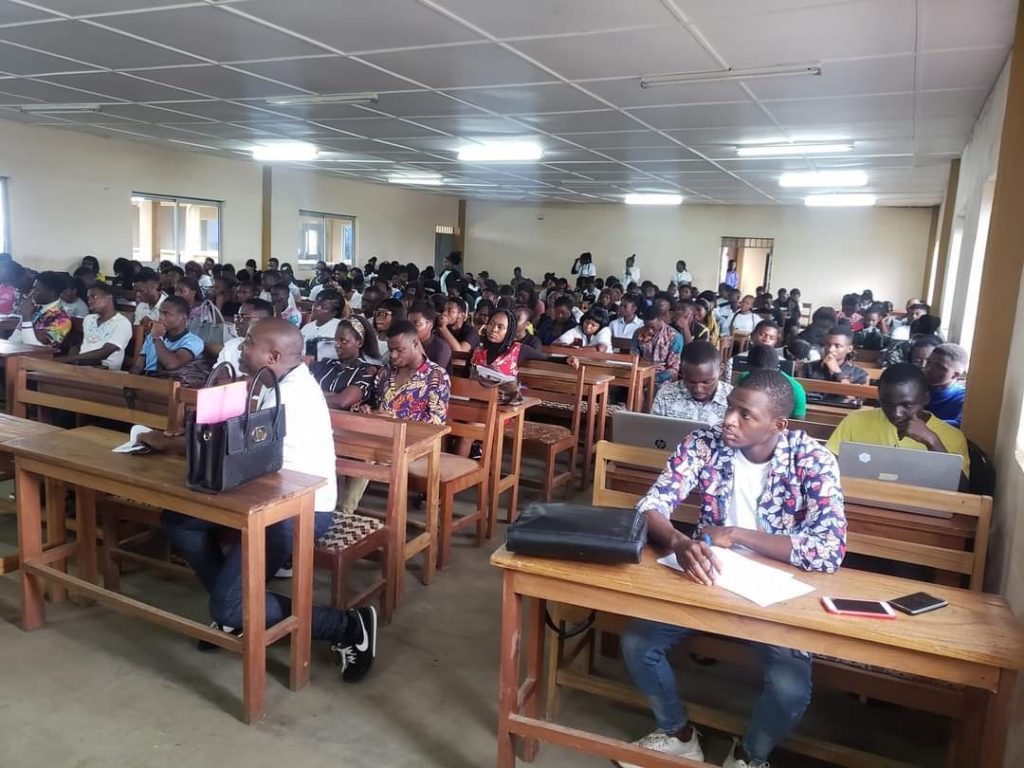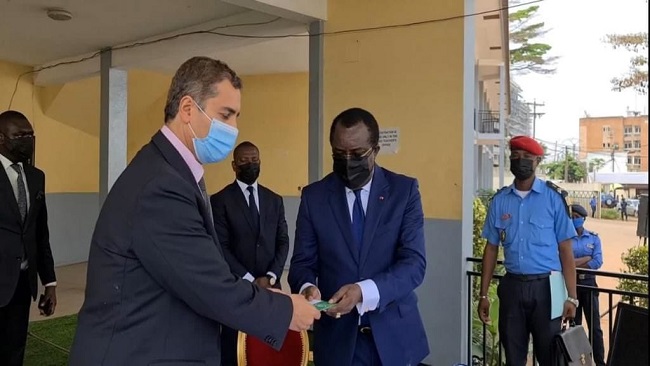5, June 2022
Eposi Njoh Monyengi is first Cameroonian woman to install and maintain solar panels in her community 0
The sun shone from a cloudless sky in a quiet, bushy neighbourhood in Tiko, in Cameroon’s Southwest region. Eposi Njoh Monyengi was busy at work.
In less than an hour, she successfully installed a solar panel on a roof.
Supplying renewable energy to remote communities across Cameroon has become a passion for Monyengi, 44.
“My main aim is to light the community,” said the mother of three, the first woman to install and maintain solar panels in her community.
In Tiko, she has won respect for her work and fondly referred to as “solar mama.”
In 2019, with the help of a local non-governmental organization (NGO), Rural Women Development Project, Monyengi travelled to India, where she studied installation and maintenance of solar panels for six months.
Since her return to Cameroon, she has installed solar panels in over 200 households, impacting more than 600 people.
Monyengi’s work has provided inspiration and ignited hope among her neighbours, friends and family alike in Ombe, her native village also known as Bamukong, on the outskirts of Tiko.
SUNNY HOPE
For over 50 years, the village with about 400 inhabitants had no electricity.
In May last year, Monyengi took a motorcycle to the banks of the Ombe River and then crossed the river on a canoe to reach the remote village.
In three months, she installed solar panels in 54 households.
When reporters visited the village, the village was full of life and energy, and music boomed from bars in the agrarian community.
“We are very happy,” said Ignatius Tamala, whom Monyengi appointed as chairman of the solar committee of the village.
“The kids are studying well, until 10, 11 at night,” said the 47-year-old father of five. “They study very comfortably because there is electricity.”
As the sun set and darkness began falling over the village, 49-year-old Gladys Fienyam switched on her solar bulb and started grilling fish. She has been grilling and selling fish for eight years.
Not long ago, nightfall would have forced her to stop working, but now Fienyam can grill fish for as long as she wants.
“I am extremely happy. I don’t use torch again. I have more customers now and mostly because of light,” she said.
Across Tiko municipality, villagers said their standards of living have since improved remarkably thanks to access to solar energy.
Monyengi’s success story is a booster to the fight against climate change that has taken its toll on the livelihoods of people especially in Africa where droughts, erratic rainfall, floods have become more frequent.
Since 2015, Cameroon has made renewable energy a priority, especially for rural electrification.
WOMEN EMPOWERMENT
But the project is not just about going green.
Monyengi has made it a point of duty to train more “solar mamas.”
“When you empower women, you have empowered a whole nation,” she said. “When people see me, they are so excited to see a woman because not every woman can do it. Just their happiness encourages me to do more for them.”
After losing her job as a plantation worker, Cecilia Otto, 55, was low-spirited and began struggling to eke out a living as a farmer.
“‘Solar mama’ convinced me that I should learn how to install solar panels,” said the mother of five. “I was reluctant (at first) but I finally accepted. Today I am pleased that I did.”
Otto is among over 50 women trained by Monyengi to install and maintain solar panels in rural communities. She now accompanies Monyengi regularly to install the panels.
They were also joined by 61-year-old Joan Nkweti, a retired civil servant and widow with four children.
“When I heard about solar installation, I was so interested because it makes me exercise what I really wished to do as a youth,” she said.
“I am so happy I achieved something at this age,” Nkweti said.
“I can go and install solar panels without anybody’s help, because the training teaches you what to do and what not to do,” she said.
“You feel so satisfied. You feel so happy for achieving something,” Nkweti said.
As the world observes World Environment Day, Monyengi hopes that the government and international NGOs will help her expand the project to other communities.
Source: Xinhuanet


























22, August 2022
Wärtsilä to provide automation upgrade for an iconic power plant in Kribi 0
The technology group Wärtsilä will carry out an upgrading project of the electrical and automation systems to ensure optimal reliability of the Kribi power plant in the Republic of Cameroon. The 216 MW plant has been in operation for nearly ten years, operating with 13 Wärtsilä 50DF dual-fuel engines running primarily on natural gas. At the time of commissioning, it was the largest gas engine power plant in Sub-Saharan Africa. Wärtsilä will also support the customer’s operational and maintenance performance with a 10-year long-term service agreement.
The order with Wärtsilä was placed by Kribi power development company (KPDC), a subsidiary of Globeleq, an independent power producer (IPP) and the owner and operator of power generating facilities across Africa. The order will be booked in Wärtsilä’s order intake in Q3/2022.
“The Kribi power plant has a vital role within the African energy sector. It is still today supplying two-thirds of the thermal energy in Cameroon. Cameroon’s energy system relies heavily on hydropower, but has uncertain resources of water. The Kribi plant, therefore, plays a key role in ensuring a supply of safe, cheap, and reliable energy. For this reason we are keen to upgrade the power plant’s automation systems to the latest design to ensure optimal reliability, and to strengthen our cooperation with Wärtsilä, leveraging their competences on a continuous basis within the framework of the long-term service agreement,” commented Gionata Visconti, Chief Operating Officer, Globeleq.
Wärtsilä has a strong regional presence, which enables us to provide valuable technical support that optimises engine performance and maximises the production capabilities of this power plant which has such a significant role in Cameroon’s power supply. We are also in a position to ensure the availability of critical spare parts, and this is an essential element within the long-term service agreement between our companies. All in all, this is a very important project, both for the customer and for Wärtsilä,” said Markus Ljungkvist, Vice President, Services, Wärtsilä Energy.
The project is scheduled to commence in 2023. To ensure the continuity of the plant’s output, the work will be carried out on one engine at a time. The long-term service agreement includes remote operational support, maintenance planning, technical advisory and remote troubleshooting services, as well as spare parts.
Long-term service agreements are an integral part of Wärtsilä’s lifecycle services offering. They are based on utilisation of the latest digital technologies, and supported by the company’s extensive know-how and understanding of power generation installations.
Wärtsilä has altogether supplied 550 MW of generating capacity to the Republic of Cameroon, and 7.5 GW to the whole of Africa, of which more than 25 per cent are covered by Wärtsilä service agreements.